How does Forex work?
Contents
Let me guess, you were just minding your own business on some random website, reading some random articles, when you started to get bombarded by ads about Forex, am I right? No? Well, it’s true in most cases. Anyway, you’re here to find out what Forex is truly about, how does it work? why should you do it? and why are there so many single dads buying yachts thanks to it? Well, this article isn’t about that actually and most (emphasis on “most”) of those ads are false, so clear your head and let’s go.
First things first, if you haven’t checked out our article about what Forex actually is, we greatly recommend it. In order to truly understand how Forex works, you need to know the product first. Just like a car (If you haven’t noticed already I like comparing things to cars), you need to know that it is a way of transportation to truly understand what’s the engine or exhaust is for. Let’s get into details and truly see how Forex works. Maybe you’ll be able to buy a yacht after this article yourself, who knows?
The nature of the FX market
Alrighty, let’s get into the nature of FX. Not the green stuff, the trading stuff. Let’s start with the official explanation and then I’ll explain with a story. How Forex works is that people purchase different currencies and then speculate whether or not those currencies will rise in price so that they could sell them. Imagine a re-seller who buys items in China and sells them in the US for a profit. The same thing happens here, you buy US dollars and then just wait for them to rise in price so that you can sell them and make a profit yourself. OK, that was the hard explanation let’s get to the story.
Meet Steve. You may remember him from the last article, well we’re going to let him help us in explaining how Forex works as well. Steve is a normal guy, lives in New York City and has a job he hates. After some time he gets sick of it so much that decides to go on vacation to Italy. So everything is ready he has the ticket, he boards the plane and flies to Palermo. But there is one problem, the moment he arrives in Palermo he has difficulty buying a sandwich and everybody is talking to him in Italian, so he can’t understand why. You see, Italians use Euros as their currency, not Dollars, which Steve is more accustomed to. Therefore he needs to exchange his dollars into Euros. So he does this with $10 and in return gets 5 Euros. Which means that 1 EUR costs 2 USD. After a month of vacation, he finds out that he didn’t spend any of his 5 EUR. So before he goes back to the USA he needs to exchange those back. But he soon finds out that after a month he doesn’t get his $10 back, he instead got $15, why? The reason is that while he was on vacation, some events occurred that made the USD depreciate, meaning that now 1 EUR costs 3 USD instead of 2 a month ago. So, therefore, Steve just made a profit without even doing anything.
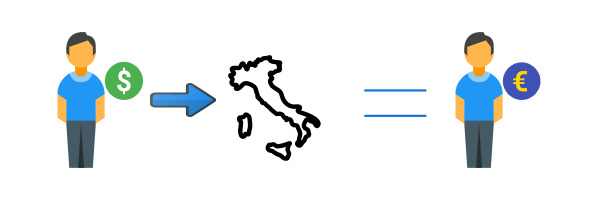
That was a big story, but hopefully informative. Now, this doesn’t mean that you have to travel halfway across the world to do the same no no that’s not a good explanation of how Forex works. The same thing happens every single day, all day around the world online, when transactions are made in large volumes. Traders buy currencies en-masse and then sell them when they can make a profit.
How Forex works all day all night
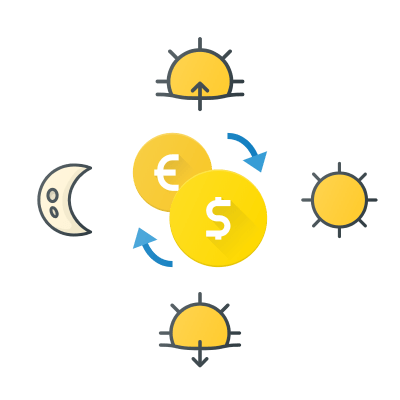 One of the primary advantages of Forex is that it can work 24 hours every day except weekends. You see, when you make transactions they need to be processed or the “market needs to be open”. The reason why this is an advantage is that some of the other markets close down relative to their local time. For example, you cannot trade stocks with Japanese companies with a US time zone, because brokers don’t work during those hours. In terms of Forex, it is quite simple. Let’s bring an example. For example, Steve is living in the United States and wants to trade The USD for EUR. In order for him to do that a specific broker or bank needs to be open to process his order, the same thing happens with Hans, when he decides to trade EUR for USD, a specific broker needs to be open for him in Germany. Thanks to the currency pairs, the market is able to work all day thanks to brokerages and banks opening up every hour with the time zones.
One of the primary advantages of Forex is that it can work 24 hours every day except weekends. You see, when you make transactions they need to be processed or the “market needs to be open”. The reason why this is an advantage is that some of the other markets close down relative to their local time. For example, you cannot trade stocks with Japanese companies with a US time zone, because brokers don’t work during those hours. In terms of Forex, it is quite simple. Let’s bring an example. For example, Steve is living in the United States and wants to trade The USD for EUR. In order for him to do that a specific broker or bank needs to be open to process his order, the same thing happens with Hans, when he decides to trade EUR for USD, a specific broker needs to be open for him in Germany. Thanks to the currency pairs, the market is able to work all day thanks to brokerages and banks opening up every hour with the time zones.
Now the reason I am mentioning banks and brokerages is that there are different levels when it comes to Forex trading and it helps me to explain how Forex works simply. These two different levels are what define Forex, they are basically how Forex works.
Institutional Forex and how it works
Institutional Forex is the largest of the two. Thanks to this we can easily see the difference between trading volumes in markets. Imagine an individual investor of Forex, who just sits at his computer and buys and sells currencies, an amount of like couple of thousand dollars. Now imagine everything else that has to deal with currency exchange, that’s institutional Forex.
Alrighty, let’s bring in another story for you. A construction company called X is located in Japan and is currently running out of steel beams to continue their construction of the world’s largest apartment complex. However, Japan has been hit by a serious deficit in steel production and therefore has seen it’s price dramatically increase. So X has nothing else left than to import it from somewhere else. Now, company Y in the United States is a manufacturer of steel beams and is looking for opportunities to sell them abroad. These two companies get in touch with each other and decide to make a $1 million deal. What’s about to happen? Well, company X needs to now pay company Y so that they can start shipping it to Tokyo. However, company Y has very specific guidelines for the payment, it needs to be in USD, they will not accept the Japanese Yuan. So they both contact their local banks and warn them about the payment.
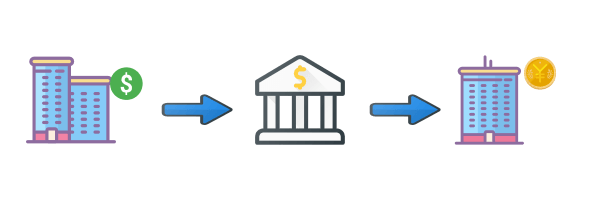
Company X tells them that they are about to make a transfer worth $1 million, but have to pay it in Yen to the bank. After the payment, the Japanese banks transfer the funds to the US bank, which then converts it to USD and gives it to company Y. What happened? well the US bank just received $1 million worth of yen that it kept, and gave out the USD, changing the supply. This is mostly how it works with countries that feature major currencies. Major currencies are ones like the USD, Euro, Japanese Yen, British Pound and etc. But there is also another more complex explanation of how Forex works.
Not every bank has a conversion system for every currency in the world. For example, a bank in Russia would not be willing to receive payments in Indian Rupees, it would much rather take USD because then it could convert it a lot more easily. Therefore banks sometimes agree with each other to settle with an intermediary currency. For example, an Indian company gives their bank $1 million worth of Rupees, the bank converts them to USD and transfers them to the Russian bank. The Russian bank then converts them to Rubles and gives them to the local company. All of this hassle is because there are very few people in Russia that would want to buy Indian Rupees, especially $1 million’s worth. Therefore these smaller currency banks agree to have an intermediary currency like the USD or the Euro. That was how Institutional Forex works, I know it may seem complex but you don’t have to worry about it as you will most likely be considered as a retail Forex trader, which is a lot more simple I promise.
Retail Forex and how it works
Now that we’ve discussed Institutional Forex you should understand that it is an exclusive segment of the market for large corporations, government, and banks, transactions there are made in the billions. Thanks to the volume differences we have a completely different segment for Retail FX.
You see there’s a history behind Forex that birthed the retail segment. Before the internet, it was exclusively for the corporations and banks. But after the digital boom, a normal guy like you and me could start accessing the market thanks to the internet. However, this market needed a middleman, which is now referred to as the Forex broker. Every transaction made by an individual trader is part of the retail segment, which is not 5,5% of the whole market.
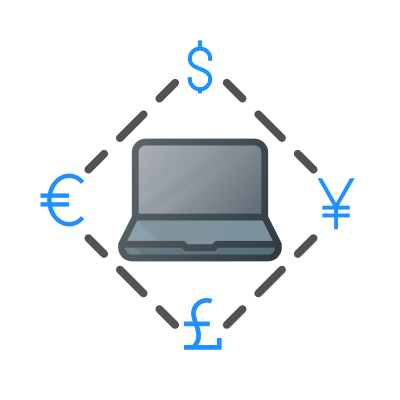 Now let’s get more into detail with how FX works for retailers. Let’s get back to Hans in Germany. He has been active in retail FX segment for a while now but has hardly made any profits. However, he finds a news article saying that military preparations are starting in Norway for example, which means that a lot of money is going to be spent and speculation is going to start about full out war. All of this means that the Norwegian Krone will depreciate, its price is going to go down significantly, because there will be no guarantee that the economy will keep up with the war. It so happens that Hans has some Krones left over from his last few trades, so what he does is that he sells them immediately while they are still at a high price. Let’s say the war starts and the price of krone goes tumbling down, Hans has now the option to buy krone at a cheaper price than he sold it, which he does. After the war is over, the economy resumes and krone once again rises in price becoming the same price it was before the war. All of this means that Hans was able to make a profit by selling fewer Krones, buying more Krones and then selling them again. This is mostly how speculations work, information gets passed down by governments, the journalists document it and experts analyze it. Pretty much every major issue in the world has an effect on a specific country’s currency making speculation actually work and drive the market alongside it.
Now let’s get more into detail with how FX works for retailers. Let’s get back to Hans in Germany. He has been active in retail FX segment for a while now but has hardly made any profits. However, he finds a news article saying that military preparations are starting in Norway for example, which means that a lot of money is going to be spent and speculation is going to start about full out war. All of this means that the Norwegian Krone will depreciate, its price is going to go down significantly, because there will be no guarantee that the economy will keep up with the war. It so happens that Hans has some Krones left over from his last few trades, so what he does is that he sells them immediately while they are still at a high price. Let’s say the war starts and the price of krone goes tumbling down, Hans has now the option to buy krone at a cheaper price than he sold it, which he does. After the war is over, the economy resumes and krone once again rises in price becoming the same price it was before the war. All of this means that Hans was able to make a profit by selling fewer Krones, buying more Krones and then selling them again. This is mostly how speculations work, information gets passed down by governments, the journalists document it and experts analyze it. Pretty much every major issue in the world has an effect on a specific country’s currency making speculation actually work and drive the market alongside it.
But where does the money come from?
There are a couple of differences between retail and institutional. In terms of institutional, the volumes are so large that the only players capable of conducting such traders are the banks, therefore you have the term “interbank system”. Most of the times institutional Forex is not done as a means to make a profit, It’s just done as business, normal procedure, simple transfers. Most of the speculations and trading for profits is done on the retail segment.
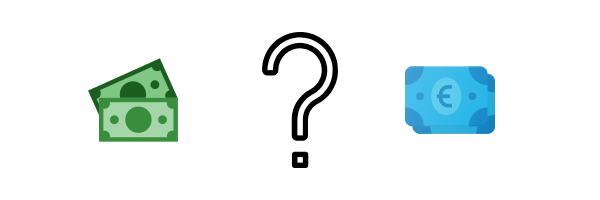
The retail segment is so small that banks don’t even get involved sometimes. About $100,000 of investments is something that would make a bank interested, but in most cases, the volume is a lot smaller. So where does the money actually come from? You see, when you hold an asset and want to sell it, you need to find a buyer. Forex trades now are conducted so fast that you think that the broker or the bank just buy it immediately. In some cases that is actually true with brokers, but in most cases, the platform just quickly finds a potential buyer and connects them with you. The retail segment is so small that most brokers can actually handle conducting the trades within their own platforms, not having to get banks involved. Thanks to this they can charge fees for the trades you make, creating their business model.
Conclusion
In conclusion, the way Forex works should not be too alien for you. You’ve most certainly done it before and now that I brought into attention you may actually recall some moments when you were on vacation. The Forex market has been nothing but a blessing to this world as it has brought in so many opportunities for international business. Many people have built their lives upon it and even more, have failed. It’s like the veins of our modern world, without it, economies would crumble in an instant. So next time you get asked about whether or not you want to quit your day job and start trading Forex for a living, you’ll be able to answer a lot of those questions.
Whether or not you’ll start trading, I still hope this article was in some ways helpful for you, good luck!


























Comments (0 comment(s))